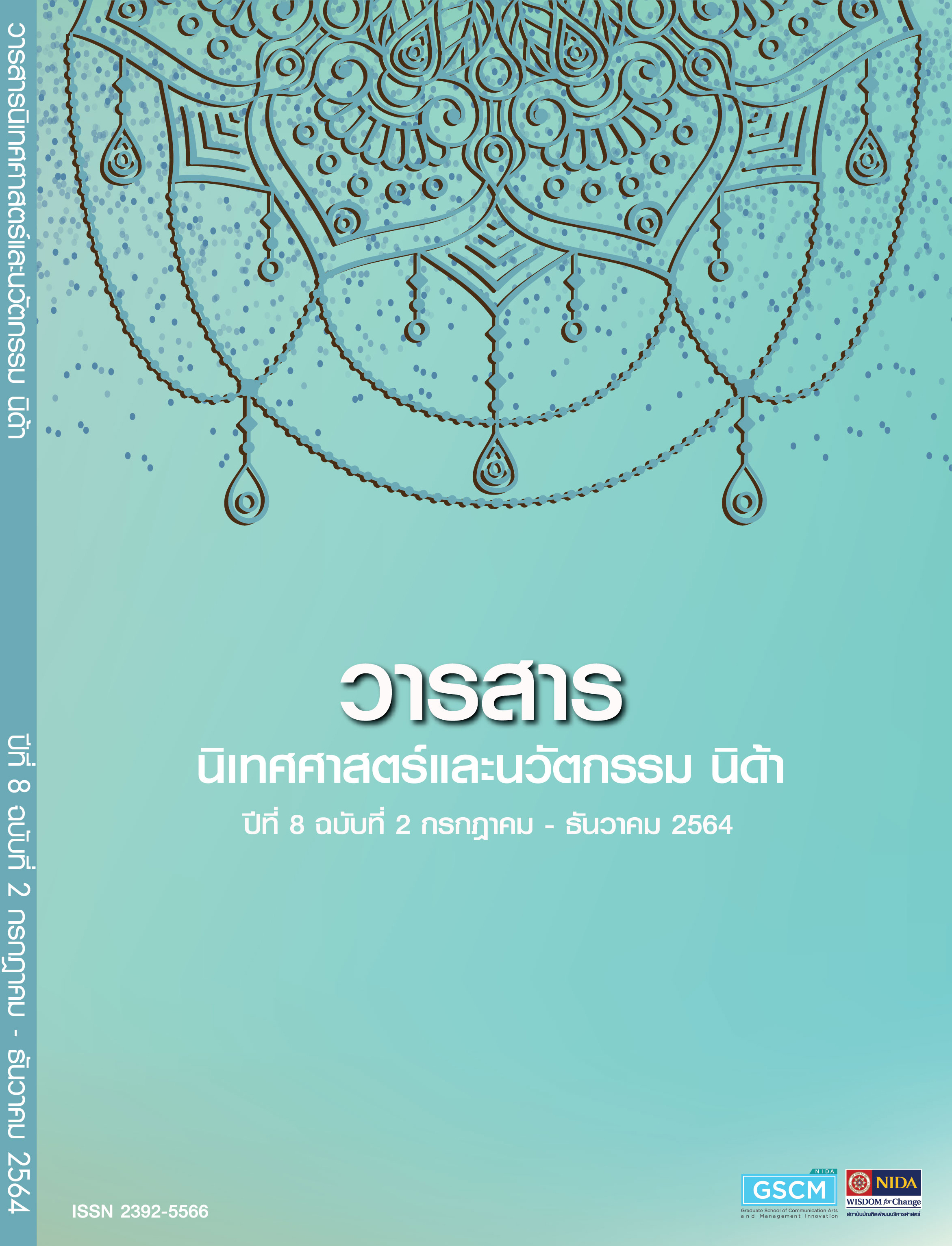Critical Skills for 21st Century, Perceived Self-efficacy, Social Influences, Policy Support and the Relationship Between Parents and Youths that Serve as Predictive Factors for Digital Content Creation and Sharing of Thai Youths, from Parents’ Perspectiv
Main Article Content
Abstract
This research aims to study the perspectives of parents towards critical skills for 21st century, perceived self-efficacy, social influences, policy support and the relationship between parents and youths that serve as predictive factors for digital content creation and sharing of Thai youths. The research was conducted using quantitative method. Questionnaires were used to collect data from 403 parents whose children were in primary schools. The findings reveal that parents believed their children had the highest skill in information-related skills and perceived their children to be competent in several tasks in schools. Parents also believed that the top three groups of people who were most influential to their children were 1) teachers or tutors 2) parents and 3) online influencers such as bloggers, YouTubers, reviewers. The parents believed that "Thailand 4.0" was the most helpful policy to support their children in their digital content creation. The testing of hypotheses found that the factors of 21st century skills of youths and social influences could jointly and significantly predict digital content creation. The results of this study led to the recommendations for the stakeholders to collaboratively and effectively develop critical skills for Thai youths.
Article Details

This work is licensed under a Creative Commons Attribution-NonCommercial-NoDerivatives 4.0 International License.
ข้อความและความเห็นในวารสารนิเทศศาสตร์และนวัตกรรม นิด้า เป็นของผู้เขียนแต่ละท่าน มิใช่ของคณะนิเทศศาสตร์และนวัตกรรมการจัดการ สถาบันบัณฑิตพัฒนบริหารศาสตร์
References
กรมกิจการเด็กและเยาวชน. (2561). รายงานการพัฒนาเด็กและเยาวชน ประจำปี 2560. สืบค้นจาก https://www.dcy.go.th/webnew/upload/download/file_th_20181211144021_1.pdf
ปิยาพัสร์ เทนอิสสระ และพรพรรณ ประจักษ์เนตร (2560) วารสารการสื่อสารและการจัดการ นิด้า ปีที่ 3 ฉบับที่ 2 (พฤษภาคม - สิงหาคม 2560)
พิชญาณี ภู่ตระกูล. (2016). การเปิดเผยตนเองในเครือข่ายสังคมออนไลน์: แนวทางการศึกษาปัจจัยที่มีอิทธิพลและผลกระทบ. Journal of Behavioral Science for Development, 8 (2)
วิจารณ์ พานิช, ( 2555) วิถีสร้างการเรียนรู้เพื่อศิษย์ ในศตวรรษที่ 21. Walailak Journal of Learning Innovations, 1(2), 3-14
Al-Zahrani, A. (2015). Toward digital citizenship: Examining factors affecting participation and involvement in the internet society among higher education students. International Education Studies, 8(12), 203-217. http://dx.doi.org/10.5539/ies.v8n12p203
Atoy, M. B., Garcia, F. R. O., Cadungog, R. R., Cua, J. D. O., Mangunay, S. C., & de Guzman, A. B. (2020). Linking digital literacy and online information searching strategies of Philippine university students: The moderating role of mindfulness. Journal of Librarianship and Information Science, 0961000619898213. https://doi.org/10.1177/0961000619898213
BarekeT-BoJMeL, L., & Shahar, G. (2011). Emotional and interpersonal consequences of self-disclosure in a lived, online interaction. Journal of Social and Clinical Psychology, 30(7), 732-759.
behavior in adolescent students (Master’s thesis) Applied Research Applied Psychology, Behavioral Science Research Institute, Srinakharinwirot University.
Bonhommer, J., Christodoulides, G., & Jevons, C. (2010, April). The impact of user generated content on consumer-based brand equity. In 9th Thought Leaders International Conference on Brand Management (Vol. 61, pp. 0-16).
Dolničar, D., Boh Podgornik, B., Bartol, T., & Šorgo, A. (2020, 2020/04/25/). Added value of secondary school education toward development of information literacy of adolescents. Library & Information Science Research, 101016. https://doi.org/https://doi.org/10.1016/j.lisr.2020.101016
Intune, S. (2009). Psychosocial factors and effects on stress management of reading
Javed, M. S., Athar, M. R., & Saboor, A. (2019, 2019/01/01). Development of a twenty-first century skills scale for agri varsities. Cogent Business & Management, 6(1), 1692485. https://doi.org/10.1080/23311975.2019.1692485
Jones-Jang, S. M., Mortensen, T., & Liu, J. (2019). Does Media Literacy Help Identification of Fake News? Information Literacy Helps, but Other Literacies Don’t. American Behavioral Scientist, 0002764219869406. https://doi.org/10.1177/0002764219869406
Kazdin, A. E. (1974). Reactive self-monitoring: The effects of response desirability, goal setting, and feedback. Journal of Consulting and Clinical Psychology, 42(5), 704–716.
Kazdin, A. E. (1974). Reactive self-monitoring: The effects of response desirability, goal
Krejcie, R. V., & Morgan, D. W. (1970). Determining sample size for research activities. Educational and psychological measurement, 30(3), 607-610.Bandura, A. (1969). Principle of behavior modification. Renehart and Winston
Lazonder, A. W., Walraven, A., Gijlers, H., & Janssen, N. (2020). Longitudinal assessment of digital literacy in children: Findings from a large Dutch single-school study. Computers & Education, 143, 103681.
Palardy, G. J. & Rumberger, R.W. (2019). The effects 21st century skills on behavioral disengagement in Sacramento high schools. In J. Demanet and M. Van Houtte (Eds.), Resisting education: A cross-national study on systems and school effects (pp. 53-80). The Netherlands: Springer.
Schultz, D. P., & Schultz, S. E. (1998). Psychology and work today: An introduction industrial and organizational psychology. (7th ed.). Prentice-Hall setting, and feedback. Journal of Consulting and Clinical Psychology, 42(5), 704–716.
Sevilla-Pavón, A. (2019). L1 versus L2 online intercultural exchanges for the development of 21st century competences: The students’ perspective. 50(2), 779-805. https://doi.org/10.1111/bjet.12602
Sevilla‐Pavón, A. (2019). L1 versus L2 online intercultural exchanges for the development of 21st century competences: the students’ perspective. British Journal of Educational Technology, 50(2), 779-805.
Stupple, E. J. N., Maratos, F. A., Elander, J., Hunt, T. E., Cheung, K. Y. F., & Aubeeluck, A. V. (2017, 2017/03/01/). Development of the Critical Thinking Toolkit (CriTT): A measure of student attitudes and beliefs about critical thinking. Thinking Skills and Creativity, 23, 91-100. https://doi.org/https://doi.org/10.1016/j.tsc.2016.11.007
Tappen, R. (2010). Advanced nursing research. Jones & Bartlett Learning. The 2018 DQ Impact Study https://www.thebangkokinsight.com)
Van Laar, E., van Deursen, A. J. A. M., van Dijk, J. A. G. M., & de Haan, J. (2019). Determinants of 21st-century digital skills: A large-scale survey among working professionals. Computers in Human Behavior, 100, 93-104. https://doi.org/10.1016/j.chb.2019.06.017
Wheeler, S. (2013). Just how far can they go? http://www.stevewheeler.co.uk/2013/05/justhow-far-can-they-go.html
Wood, R., & Bandura, A. (1989). Social cognitive theory of organizational management. Academy of management Review, 14(3), 361-384.


